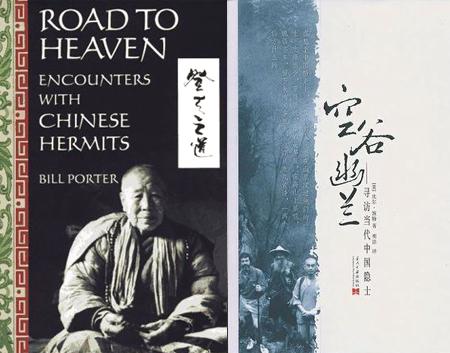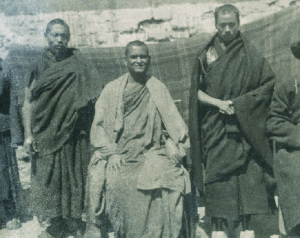“The Tao never changes. What we eat and wear has changed, but the Tao hasn’t changed. There have been advances in science and society, but so what? We’re eating better now. But it’s the same old Lao-tzu.”
– Master Yang, Road to Heaven, p. 218
To simply be without doing anything else is a powerful statement about one’s personal existence. Just being is much more minimalist than the acts of speech, writing, or doing. This expression or mode of harmony with the universe belongs to the hermit. And their hold on the Chinese imagination is aptly summed up on the very first page of Bill Porter’s Road to Heaven: “Distant and insignificant, they were the most respected men and women in the world’s oldest society.” In this tidy paradox, Porter (better known by his pen name Red Pine) highlights how hermits loved the wilderness more than civilization. They left behind all claim to fame and status – and were promptly showered with it by generations of Chinese rulers, commentators, poets, and storytellers. Hermits were the most respected of individuals, and neither civilization nor modernity has snuffed away this reverence.
Bill’s book follows many different formats: journal, history, storybook and interview, with questions and answers exchanged between him and hermits scattered throughout. Above all it is a chronicle of his journey to meet these legendary figures, which began in the spring of 1989. After several failures to locate these reclusive individuals, Bill experienced somewhat of an epiphany when a monk said to him, “Of course there are still hermits in China. But when you meet them, you won’t know them. You won’t find them, unless they want to be found.” A serendipitous breakthrough was made in the Chungnan mountain range, near Xi’an. On this mountain range he met a diverse population of hermits, from Buddhist nuns and monks to Taoist masters, who seemed to be the happiest and wisest people in the entire country. Bill still fondly refers to Chungnan Mountains as “Hermit Heaven”.
After experiencing some of the drama at Tiananmen Square, he and his photographer, Steve Johnson, left for Taiwan and returned to China six weeks later. Hermit Heaven remained their prime pilgrimage site – it was too ambitious to traverse the entire vastness of modern China in search of reclusive hermits. They had begun their foray into the home of the infinite in earnest. Tenderly lively and informative, Road to Heaven takes us on a voyage from the earliest history of the Chungnan-Kunlun mountain range as the epicentre of China’s oldest religion, to various mountain peaks and remote locales, before finally ending with Taipaishan, Chungnan’s highest peak and the home of the evening star.
The book first charts Chungnan’s beginnings as the Neolithic sanctuary for spirit-communing, immortality-seeking shamans (wu, ??). Spirit mediums and diviners attested to in Shang oracle bones and Zhou dynastic texts, these brought back knowledge via lunar visions. Moon, mountain, forest, darkness – the shamans were human connections to the natural and supernatural worlds. And by establishing the hermits as the successors of the shamanic tradition (pp. 21 – 23), they become a venerable continuation of the shamans’ love of mountains and
ability to commune with the immortal beings in a world of change.
Road to Heaven presents a story of mysticism, but it is also about what all hermits wanted to do: to follow the Way (dao, ?D). Much of Chinese literature consists of a dialectic between different approaches to following the Way: public service and politics in the big cities, retiring from the world to escape the corruption of secular life, or perhaps a brief retreat into seclusion, learning from the sages, and returning to the world to achieve great things. The hermits, naturally, embodied a much more ambivalent tension between virtue and politics. Yet Bill does more than simply address the big issues. His memories of small incidences, such as casual observations or spontaneous encounters passage humour and delight:
“Halfway down the mountain we surprised two partridges, and along the trail, we stopped to pick little white stars growing out of the ground. Everywhere there were peach trees in bloom.”
Taoist themes are interwoven with Buddhist ruminations throughout Bill’s narrative, which is to be expected given the immense influence exercised by China’s only native formalized religion on the hermit tradition. Chapter Four is dedicated specially to the trail he and Johnson cut in pursuit of Laozi, the legendary founder of Taoism. But not all stories have happy endings, as Chapter Five highlights. One of the Taoist masters Bill talked to, Master Xie, confessed that Taoism was dying as an institution, and there were less than a hundred and fifty Taoist monks and nuns who could legitimately be called masters (p. 67). At times, Road to Heaven presents a stark, all-too-familiar picture of a disappearing world of men and women who already chose to disappear. Yet there are human shards of hope and even laughter – I particularly enjoyed the blind Master Yang’s observations about the differences between Buddhism and his own Taoism (p. 218) – as far as he’s concerned, Buddhists are better at practice and have less of a problem with pride!
Deeply human and gentle, Bill’s odyssey to see hermits feels very “hermit-like” too – his chronicle simply tells, expresses, “lets the reader know” – without much further objective. Of course, the hermits of old wouldn’t even have felt it necessary to tell anyone about anything. Yet his observations about the application of the Way to human affairs ring ever clearer: should one hide one’s light or let it shine through? When is it right to emerge from seclusion to establish and extend harmony in society?
After their pilgrimage, Bill and Johnson returned to the city where the journey began: Xi’an. Bill’s travelogue concludes with a visit to Wolong Temple, where the temple’s reclusive monks remind him of a Chinese proverb: a typical recluse lives on a mountain, but a great one lives in the city. Ultimately these questions should be directed to the hermits. To live as one was not simply to run away from the hurly-burly of Chinese society – be it in imperial China or the modern People’s Republic. From its Neolithic inception to its hardy endurance today, the story of the hermit remains an indispensable critique and caution about political folly and hubris, in all ages.
And one day, when you are ready, they will find you in the bustling marketplace of the world, laughing merrily with a bundle of pak choi in their wrinkled hand.
—
Porter, Bill. Road to Heaven: Encounters with Chinese Hermits. Berkeley: Counterpoint Press, 1993.

















